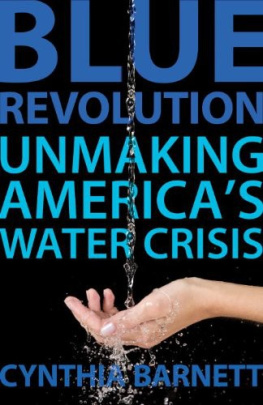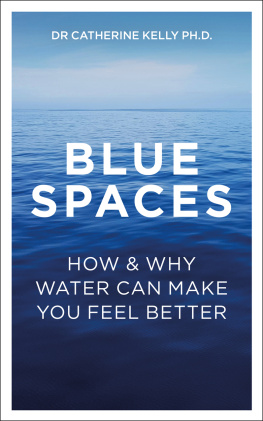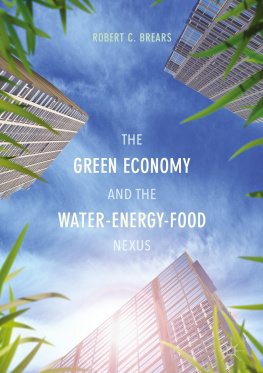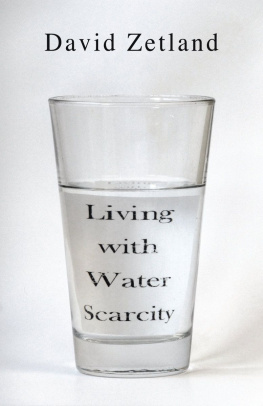BLUE REVOLUTION
Unmaking Americas Water Crisis
Cynthia Barnett
Beacon Press, Boston
For Will & Ilana
Contents
Chapter 1. The Illusion of Water Abundance
During Americas retreat to the suburbs in the 1950 s, large home lots, disposable incomes, and a nifty concrete spray called gunite gave families a new marker of success: the backyard swimming pool. For the rest of the twentieth century, residential pools symbolized upward mobility and offered a sense of seclusion not possible at city pools or even private clubs.
The following decades redefined our relationship with water itselffrom essence of life to emblem of luxury. By the time of the twenty-first-century housing run-up, even the plain blue pool had lost its luster. Adornments were needed. Aquatic affluence meant floating fire pits, glass portholes, and vanishing edges, which create the illusion of never-ending water.
The amenity to envy was no longer the diving board. The must-have, now, was the waterfall.
No community glorified the trend like Granite Bay, California.
Granite Bay is nestled on the north shores of Folsom Lake, commuting distance east of Sacramento. The upscale suburb is named for the Cretaceous age rock that underlies this region in the foothills of the Sierra Nevada. But during the housing boom, Granite Bays developers were determined to upstage the areas natural geologic outcroppings.
In Granite Bays best backyards, rocky waterfalls cascade artfully into boulder-lined swimming pools, set off with grottoes, swim-up bars, and built-in hot tubs. Thick bushes and trees bearing flowers and fruit adorn the watery wonders, making a place naturally dominated by needlegrass and sedge look more like Fiji. Precisely groomed lawns, a quarter acre and larger, complete the sublimely unnatural tableau.
On Waterford Drive, a beige ranch home with a trim green carpet out front only hints at the tropical excess out back: a pair of waterfalls flow into a clear-blue lagoon, with large rocks positioned for sunning and for diving. This is one of the more subdued motifs. Sacramento landscape architect Ronald Allison tells of a two-and-a-half-acre residential design in Granite Bay with a waterfall, a grotto, a cave, six fountains, a pool with a bridge and an island, and a ninety-foot water slide: Its fun for the grandkids.
Such fun has helped push average water use in Granite Bay to among the highest on Earth. Its residents use nearly five hundred gallons of water a person every daymore than three times the national average.
Spectacular squander in the middle of a water crisis is not much of a shock in the United States, where we use about half our daily household water bounty outdoors. The dryer the conditions, the more we tend to pour. What is surprising, however, is to find some of the worlds worst waste in the Sacramento metropolitan area. Thats because Greater Sacramento has become a national leader in finding solutions to Americas energy and climate challengesand in working to solve other problems brought about by suburban growth. Sacramento glitters with all things green. But when it comes to water, the city represents a national blind spot.
Somehow, Americas green craze has missed the blue.
Californias capital likes to call itself Sustainable Sacramento. The progressive municipal government is spending heavily on light rail and constructing only green city buildings. The utility generates solar, wind, biomass, and hydro power for customers willing to pay more for renewable energy. Sacramentos citizens choose to do so at some of the highest rates in the nation.
The city is so green, it provides organic food to public school children, bike racks to businesses, and free trees to residents who want to cool their homes with natural shade.
But with water, Sacramento isnt so enlightened. The metropolitan area, which lands regularly on lists of top green cities, smart cities, and livable cities, also has earned this startling ranking: it squanders more water than anywhere else in California. That distinction makes it one of the most water-wasting places in the United States. And that makes it one of the most water-wasting places on the planet.
Residents of the metro region use nearly gallons of water per person every daydouble the national average.
Grottoed communities such as Granite Bay arent solely to blame. Some of the same politicians who forged the new path for energy in Sacramento fought for the citys right to keep to the old road for water. The city is one of the last major metro areas in the nation to hold on to flat rates that charge residents the same no matter how much water they use.
Sacramento is by no means unique. Even as our green consciousness evolves, we often manage to ignore water not only on a global level but also in our own backyards. The Copenhagen climate accord, negotiated by the United Nations in 2010 , did not mention the most immediate threat from a changing climatethe worldwide freshwater crisis. Across the United States, we give little thought to our water use even as we replace lightbulbs with compact fluorescents and SUVs with hybrids.
The conscientious consumer who plunks down $ , for a Prius may still wash it every weekend in the driveway. The office manager who rallies every department to recycle paper is unaware of the millions of gallons of water a year that could be recycled from the buildings air-conditioning system.
How is that?
One part of the answer is the illusion of water abundance. When we twist the tap, were rewarded with a gush of fresh, clean water. Its been that way since the turn of the twentieth century, when Americans perfected municipal waterworks, indoor plumbing, and wastewater disposal as a response to diseases like cholera or typhoid fever.
Water is also our cheapest necessity. Four-dollar-a-gallon gasoline helped drive consumers to cars that cost them less to operate. Lower fossil fuel consumption and reduced carbon emissions are fringe benefits to protecting our pocketbooks. No equivalent economic incentive makes us think about our water waste. In fact, our water is so subsidized that many Americans pay less than a tenth of a penny a gallon for clean freshwater delivered right into our homes.
As a society, from a water standpoint, were fat, dumb, and happy, says Tom Gohring, executive director of the Sacramento Water Forum, a coalition of business, environmental, and other competing water interests that work together to find solutions to the regions water woes. In the history of our country, weve had some serious water shortages, but very, very seldom have people been told that they cannot turn on the taps but for an hour in the afternoon, or that they must boil water.
Water is just too easy to take for granted, Gohring says. Its always there.
This is true in Sustainable Sacramento, and its true in the scorched Southwest. The most conspicuous water consumption in America is often found in those parts of the country where water shortages are most serious. Nationwide, we use an average of gallons each day. In wet Florida, the average hits gallons. In Las Vegas, its gallons per personin one of the most water-scarce metro areas of the United States, where water managers lose sleep at night thinking about what will happen when the level in Lake Mead drops below the intake pipes that carry water to the city.
Vegas swimming poolswith their glass walls, underwater sound systems, sushi bars, and stripper polesmake Granite Bays look like they came from the Kmart garden department. But in both locales, the extreme illusion of abundance makes it all but impossible for people who live and play there to notice their personal connection to the nations water crisisto understand how wasteful water use in one house, in one backyard, multiplied by million Americans, equals trouble for the generations to come.
Next page





